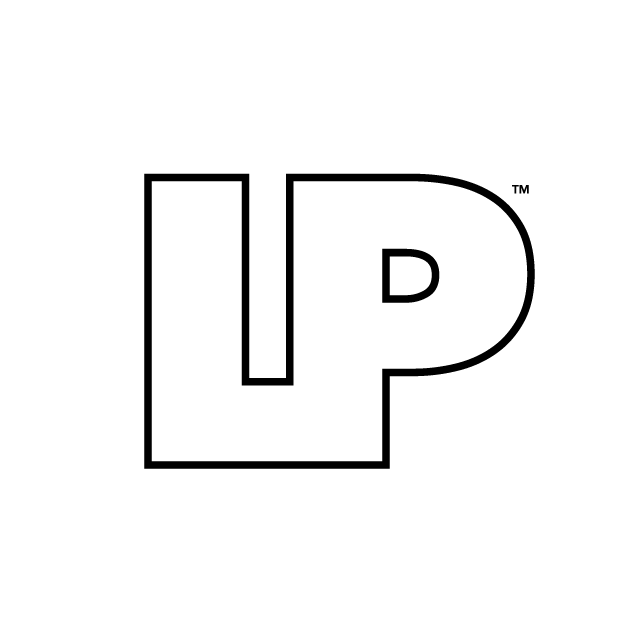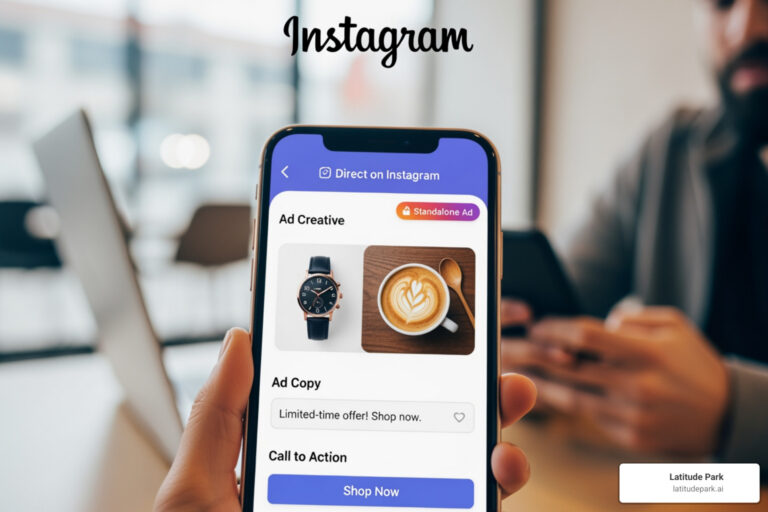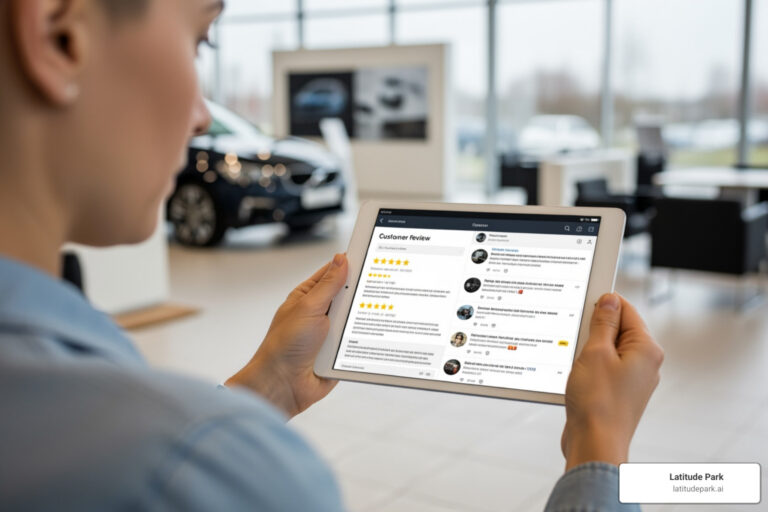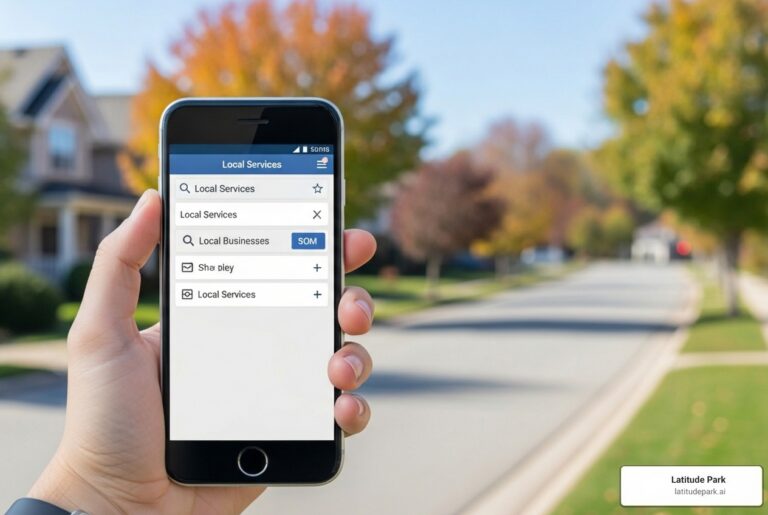Navigating the world of search engine optimization can feel overwhelming, especially for a small business owner juggling a dozen other priorities. The right software doesn't just save time; it provides the data-driven insights needed to compete with bigger players. But with hundreds of options, how do you choose? This guide cuts through the noise.
We’re not just listing features. We are providing a practical, hands-on analysis of the 12 best small business SEO tools, categorized by their unique strengths. We will dig into all-in-one powerhouses like Semrush and Ahrefs, specialized local SEO solutions such as BrightLocal, and budget-friendly options to get you started. Before diving into the specific tools that empower your digital strategy, it's essential to first grasp the fundamental concept of what is Search Engine Optimization. This foundational knowledge will help you better understand how each tool's features contribute to your overall goals.
In this comprehensive listicle, you'll learn exactly which tool fits your specific needs, budget, and technical skill level. Each review includes detailed pros and cons, transparent pricing information, screenshots, and direct links to help you make an informed decision without the marketing fluff. We'll explore real-world scenarios, like how a local bakery can use one tool to dominate the map pack, or how an e-commerce startup can use another to uncover competitor keyword gaps. By the end, you'll have a clear, actionable plan to select and implement the perfect toolkit to drive meaningful traffic, generate leads, and achieve sustainable growth.
1. Semrush
Semrush stands as a titan in the world of digital marketing, offering an all-in-one suite that is arguably one of the most comprehensive small business SEO tools available. It’s a powerful platform for business owners who want a single dashboard to manage keyword research, track rankings, audit their site's technical health, and analyze competitor strategies.
What makes Semrush unique is its sheer breadth and depth of competitive intelligence data. You can enter a competitor's domain and almost instantly see the keywords they rank for, their top-performing content, and where their backlinks come from. This functionality turns competitor research from a guessing game into a data-driven strategy.
Use Case and Implementation
A practical example would be a small business that sells custom dog collars online. Using Semrush's Keyword Magic Tool, they can discover not just "custom dog collars" but also longer, more specific phrases like "personalized leather dog collar for small dogs" which have higher purchase intent. They can then use the On-Page SEO Checker to see how their product pages for these terms stack up against top competitors, getting a concrete checklist of changes to make, such as adding specific LSI keywords or improving meta descriptions.
Key Insight: The true power of Semrush for a small business lies in its ability to reverse-engineer success. For instance, if you see a competitor's blog post about "How to Measure a Dog's Neck" is getting a lot of traffic and links, you can use Semrush to analyze its structure and backlink profile. This provides a blueprint to create a better, more comprehensive article that can eventually outrank it.
Pros & Cons
| Pros | Cons |
|---|---|
| Extensive all-in-one feature set | Can be expensive, especially for teams |
| Best-in-class competitor analysis tools | Steep learning curve for beginners |
| Excellent educational resources (Semrush Academy) | The interface can feel overwhelming |
Pricing & Access
Semrush offers several pricing tiers, starting with the "Pro" plan at around $129.95 per month. While there is a free account option, it's quite limited. For most small businesses, the Pro or Guru plans provide the necessary features for effective SEO management. The cost can be a significant investment, but its extensive capabilities often justify the price for businesses serious about growth.
Website: https://www.semrush.com
2. Ahrefs
Ahrefs is renowned for its powerhouse backlink index, making it one of the most indispensable small business SEO tools for anyone serious about link building and competitive analysis. While it offers a full suite of features, its core strength lies in providing incredibly detailed and fresh data on who links to your site and, more importantly, your competitors' sites.
What makes Ahrefs unique is the quality and clarity of its data. The platform's Site Explorer gives you a comprehensive overview of any domain's backlink profile, organic keywords, and top-performing pages. This laser focus on link data provides actionable insights that are crucial for building authority and outranking competitors in search results.
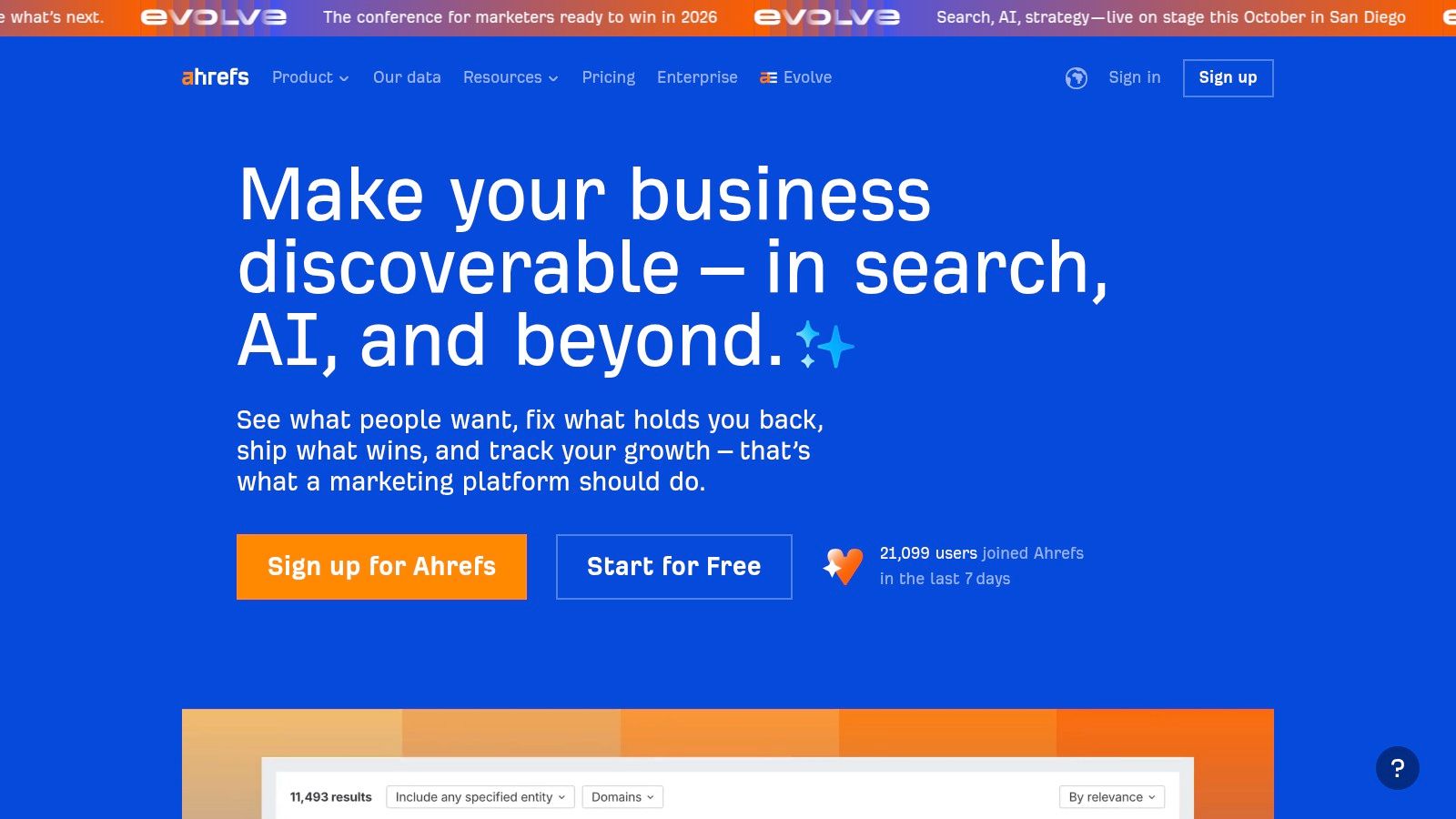
Use Case and Implementation
Imagine you run a small SaaS company. A practical use case is to enter the domain of a major competitor into Ahrefs' Site Explorer. You can then navigate to the "Best by links" report to see which of their blog posts or landing pages have attracted the most backlinks. This isn't just data; it's a content strategy roadmap. You now know exactly what topics in your industry are proven to be "link-worthy," allowing you to create similar, but better, content to attract high-quality links.
Key Insight: Ahrefs excels at turning link building into a science. A tangible insight is using its Content Gap tool. Enter your domain and a few competitors. The tool will show you keywords your competitors rank for, but you don't. This isn't just for content ideas—it's for finding high-intent keywords that are driving revenue for your rivals, which you can then target to capture a piece of that market share.
Pros & Cons
| Pros | Cons |
|---|---|
| Best-in-class backlink index and link data | No traditional free trial |
| User-friendly interface with clear visuals | Plan-based access only; no a la carte tools |
| Free Ahrefs Webmaster Tools option | Can be costly for very small businesses |
Pricing & Access
Ahrefs' pricing begins with the "Lite" plan at around $99 per month, which is suitable for many small businesses and freelancers. They also offer a free Ahrefs Webmaster Tools account that provides limited access to Site Explorer and Site Audit for your own verified websites. While there is no traditional free trial for their paid plans, the free tools offer a great way to experience the platform's power.
Website: https://ahrefs.com
3. Moz Pro
Moz Pro has long been a respected name in the SEO industry, offering a suite of tools focused on making search engine optimization accessible and understandable. It is one of the most well-rounded small business SEO tools for those who value a clean interface, reliable data, and excellent educational support to guide their strategy.
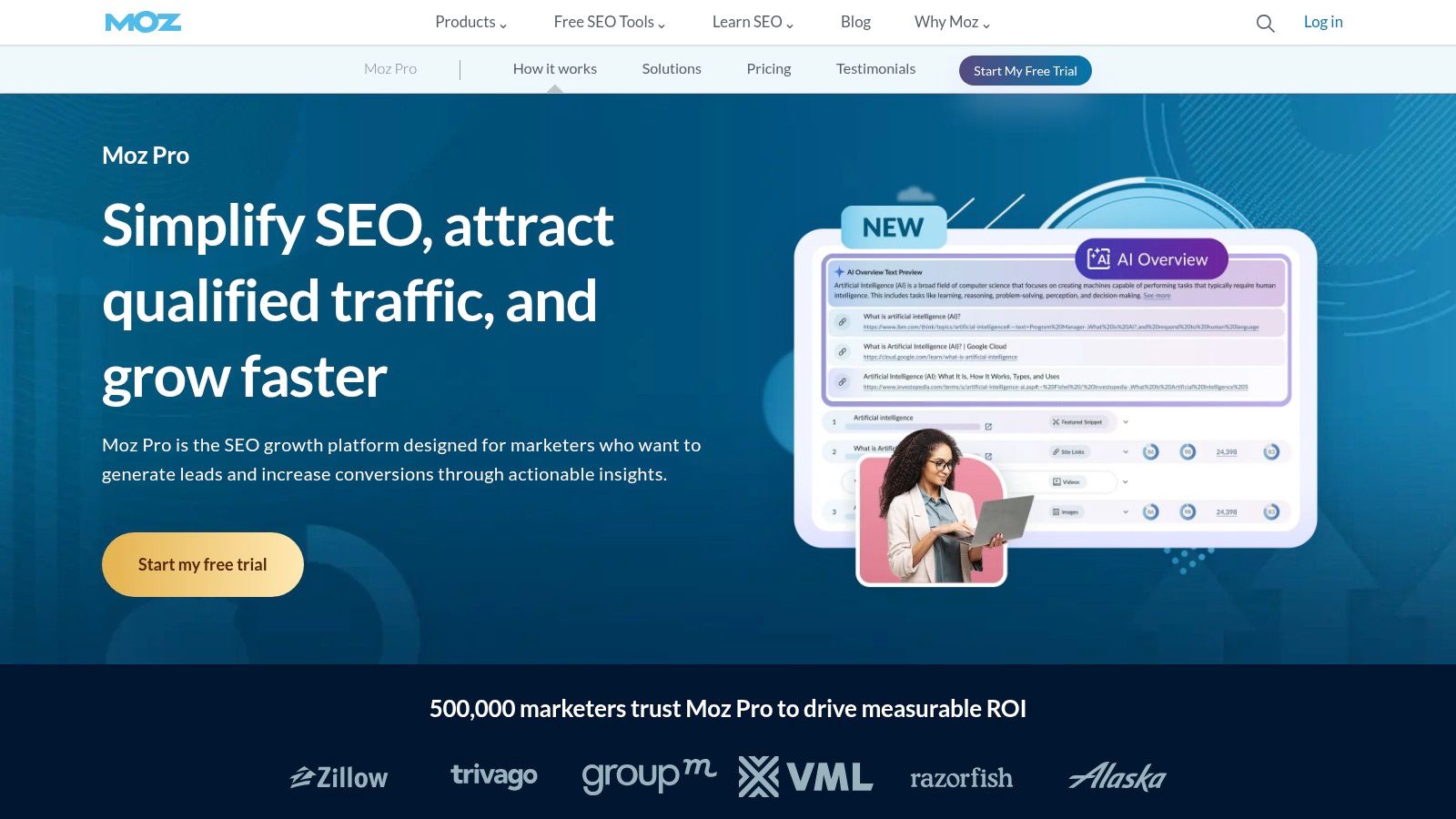
What makes Moz Pro particularly appealing is its campaign-based approach and proprietary metrics like Domain Authority (DA). This allows a small business owner to set up a project for their website and receive a clear, digestible overview of its SEO performance, from keyword rankings to technical site health, all in one place.
Use Case and Implementation
A small e-commerce shop selling handmade jewelry could use Moz Pro's Keyword Explorer to identify long-tail keywords like "artisan silver hoop earrings" and analyze their difficulty. A practical application is to then track their rankings for these terms over time within a campaign. When they see a keyword drop from page 1 to page 2, Moz Pro will have already crawled the page and might flag a new on-page issue, giving them an immediate, actionable task to fix it and regain their ranking.
Key Insight: Moz Pro excels at simplifying complex SEO data. For a business owner, a key insight comes from the weekly campaign reports. Instead of a flood of raw data, Moz provides a prioritized list of issues. For example, it might say, "Fix 5 pages with missing title tags," which is a concrete task you can complete in under 30 minutes, creating a manageable and effective SEO workflow.
Pros & Cons
| Pros | Cons |
|---|---|
| Beginner-friendly interface | Link index generally smaller than Ahrefs |
| Strong educational resources (Moz Academy) | Advanced users may want deeper data points |
| Reliable, campaign-based tracking | Some tools can feel less robust than competitors |
Pricing & Access
Moz Pro offers several plans, with its "Standard" tier starting at around $99 per month ($79 per month if billed annually). This entry-level plan provides enough capacity for a single small business to manage its SEO campaigns effectively. A 30-day free trial is also available, allowing businesses to test the full suite of features before committing to a subscription.
Website: https://moz.com/products/pro
4. Screaming Frog SEO Spider
Screaming Frog SEO Spider is a powerful and widely-respected desktop-based website crawler that performs in-depth technical SEO audits. While many small business SEO tools are cloud-based suites, Screaming Frog focuses intensely on one thing: giving you a comprehensive, granular look at your website's technical health. It crawls your site's links, images, CSS, and scripts just like a search engine would.
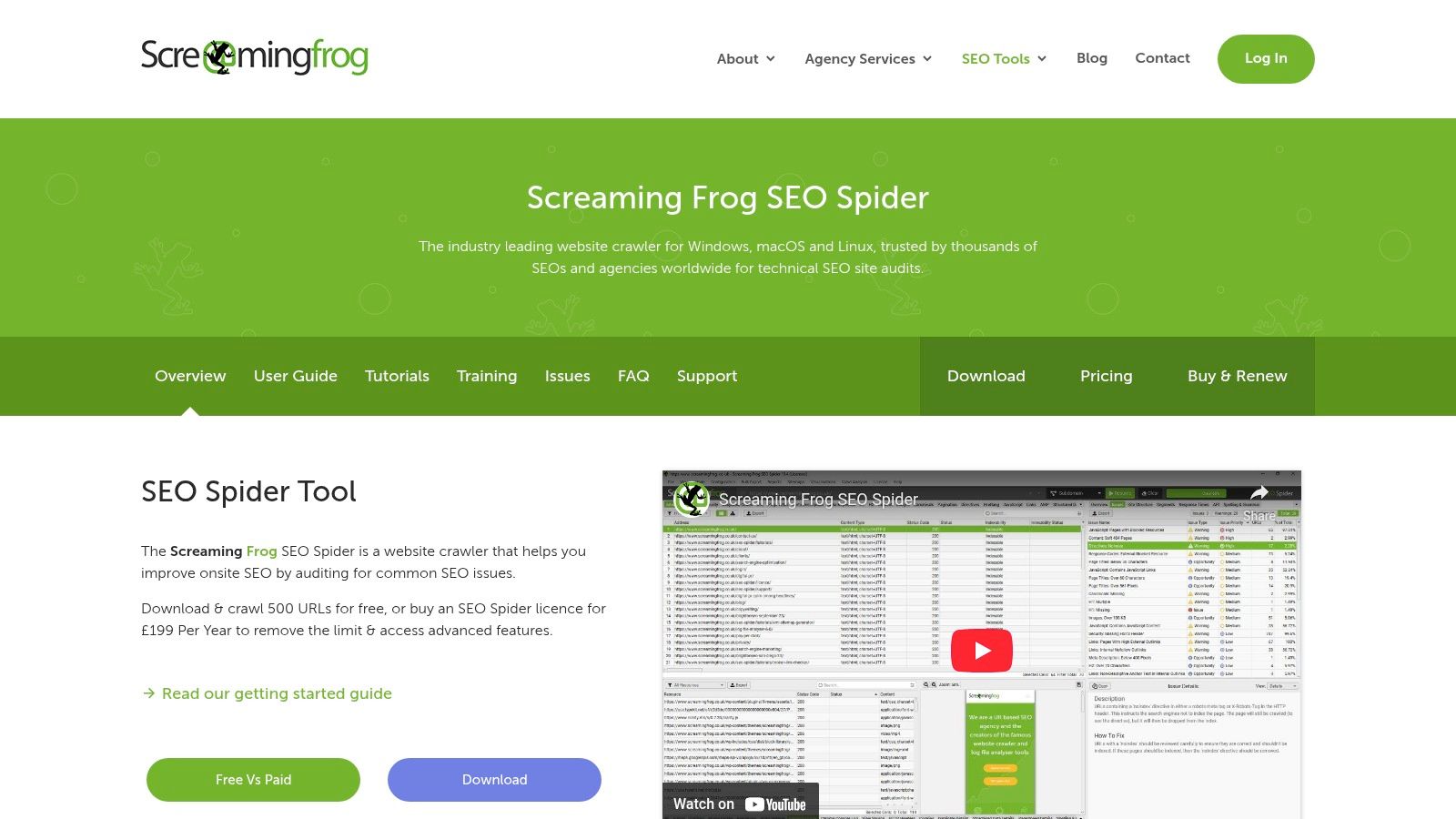
What makes Screaming Frog indispensable is its ability to quickly uncover technical issues that can severely impact your search rankings. It can find broken links (404s), audit page titles and meta descriptions, identify duplicate content, and analyze page load times. This raw data is critical for any serious SEO effort, providing a clear roadmap for on-site fixes.
Use Case and Implementation
A small B2B service provider who just completed a website redesign can use Screaming Frog for a practical post-launch audit. They can run a crawl and immediately filter for "404 Not Found" errors. This will generate a list of all the broken internal links created during the migration. They can then create a list of 301 redirects to send users and search engines from the old, broken URLs to the new, live pages, preventing lost traffic and SEO equity.
Key Insight: Screaming Frog empowers small businesses to perform enterprise-level technical audits without an enterprise-level budget. A practical insight is its ability to visualize site architecture. You can generate a crawl tree graph that shows how your pages are linked. This can immediately reveal if your most important service pages are buried too deep within the site structure, making it hard for both users and Google to find them.
Pros & Cons
| Pros | Cons |
|---|---|
| Unparalleled depth of technical insights | Desktop app requires local PC resources |
| Extremely configurable for custom crawls | Can be complex for non-technical users |
| One-time annual fee offers great value | The interface is data-heavy and clinical |
Pricing & Access
Screaming Frog offers a generous free version that allows you to crawl up to 500 URLs, which is often sufficient for very small websites or for conducting a quick audit. The paid license unlocks unlimited crawling and advanced features like integrations with Google Analytics, Search Console, and PageSpeed Insights. It costs £259 (approximately $325) per year, making it one of the best value-for-money tools in the SEO industry.
Website: https://www.screamingfrog.co.uk/seo-spider/
5. SE Ranking
SE Ranking has carved out a strong reputation as an affordable, yet powerful, all-in-one platform, making it one of the most accessible small business SEO tools on the market. It provides a comprehensive suite that covers rank tracking, website audits, keyword research, and competitor analysis, all within a user-friendly interface designed for business owners who need efficiency without a massive budget.
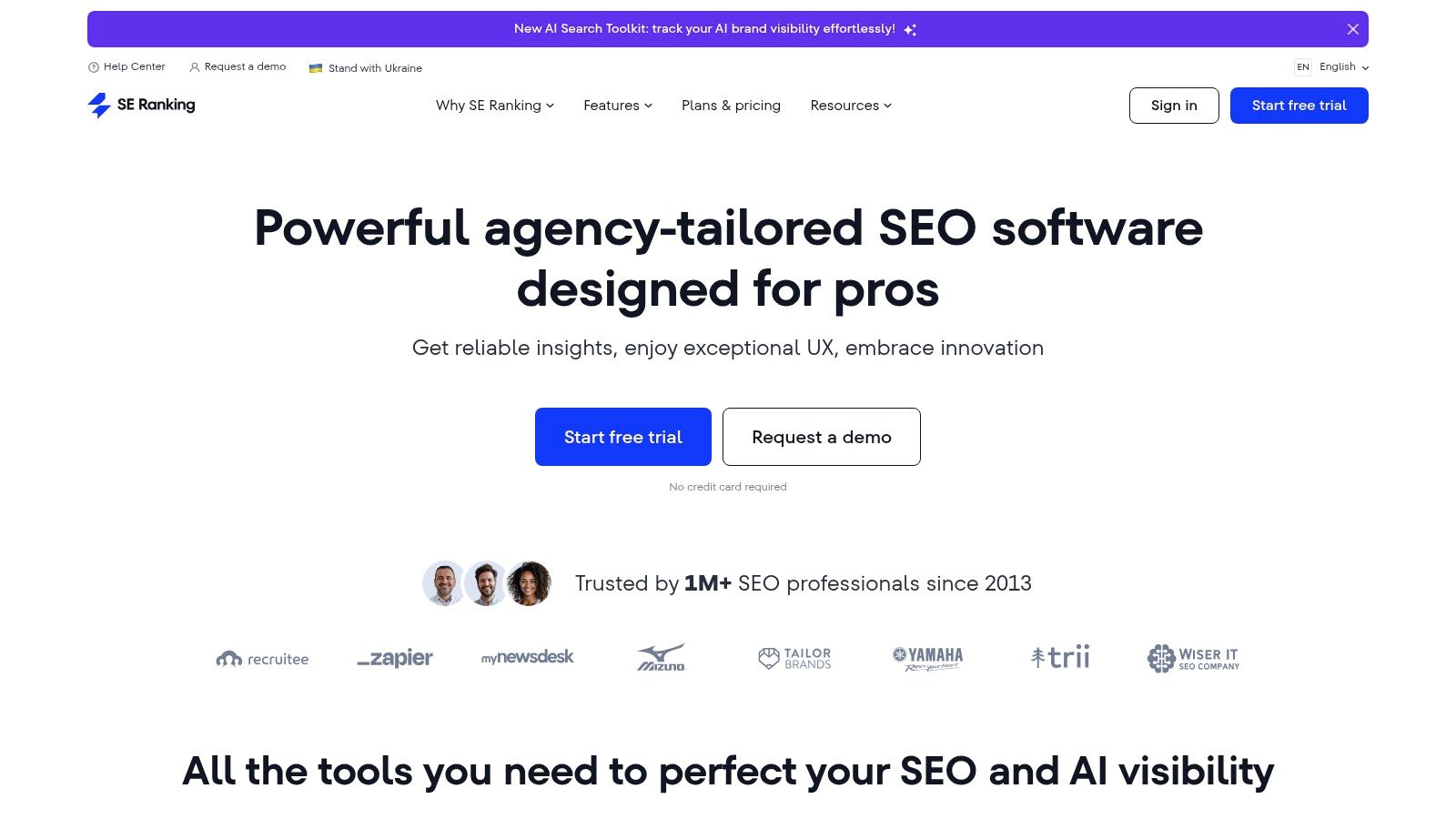
What makes SE Ranking a standout choice is its balance of robust features and cost-effectiveness. The platform's highly accurate rank tracker offers daily updates, which is crucial for monitoring the impact of SEO changes in near real-time. Furthermore, its Local Marketing module provides essential tools for managing Google Business Profile listings and tracking local map rankings, a vital component for brick-and-mortar businesses.
Use Case and Implementation
A local plumber could leverage SE Ranking’s Local Marketing toolkit. A practical action is to set up rank tracking for "emergency plumbing services" across five specific zip codes they serve. If they see a rank drop in one particular zip code, they can immediately create a geo-targeted Google Business Profile post with a special offer for that area, a direct action based on the tool's data to regain visibility where it matters most.
Key Insight: SE Ranking's strength for small businesses is its flexible and transparent pricing. A key insight for agencies or freelancers is the white-label reporting feature. You can generate professional, branded SEO reports for your clients directly from the platform. This saves hours of manual report creation and adds a layer of professionalism that helps justify your fees.
Pros & Cons
| Pros | Cons |
|---|---|
| Very competitive and flexible pricing plans | Data depth may not match top-tier rivals |
| Excellent local SEO and rank tracking features | The interface can feel busy initially |
| Strong reporting capabilities with white-label option | Some advanced features are paid add-ons |
Pricing & Access
SE Ranking’s pricing is highly customizable, starting with the "Essential" plan at around $55 per month. The cost adjusts based on the frequency of rank tracking checks (daily, every 3 days, or weekly) and the number of keywords tracked. This flexibility allows a small business to start with a lean, affordable plan and scale up as their SEO needs grow, making it a sustainable long-term investment.
Website: https://seranking.com
6. Ubersuggest by Neil Patel
Ubersuggest, developed by digital marketing figure Neil Patel, has carved out a niche as one of the most accessible and budget-friendly small business SEO tools on the market. It provides a streamlined suite of core functionalities, including keyword research, site audits, and rank tracking, making it an ideal entry point for solo entrepreneurs, bloggers, and small teams just starting their SEO journey.
What makes Ubersuggest stand out is its commitment to simplicity and affordability. While enterprise tools can be intimidating, Ubersuggest presents crucial SEO data in a clean, easily digestible format. Its interface guides users through complex concepts, offering keyword suggestions, content ideas, and backlink data without a steep learning curve.
Use Case and Implementation
A freelance content writer could use Ubersuggest for a very practical workflow. After finding a target keyword like "how to create a small business budget," they can use the "Content Ideas" report. This shows them dozens of successful blog post titles related to that topic. This is an immediate brainstorming tool to help them find a unique angle, for example, "Small Business Budget Template for Creatives" instead of another generic post.
Key Insight: Ubersuggest’s main advantage for new businesses is its low barrier to entry. A practical insight is how it simplifies competitor analysis. You can enter a competitor’s URL and see their top pages. Ubersuggest will often highlight pages that are ranking well but have low social shares. This is a clear opportunity: you can create a better piece of content on that topic and focus on social promotion to gain traction where your competitor is weak.
Pros & Cons
| Pros | Cons |
|---|---|
| Low monthly and lifetime pricing options | Smaller data breadth than enterprise suites |
| Simple, beginner-friendly interface | Limited advanced competitive intelligence |
| Good for generating content ideas | Can have occasional data accuracy issues |
Pricing & Access
Ubersuggest offers a very limited free version for basic queries. Paid plans are highly competitive, with individual plans starting around $29 per month. The most notable offer is the lifetime deal, which provides access for a one-time payment, starting around $290. This makes it a financially sound choice for businesses wanting to control long-term software costs.
Website: https://neilpatel.com/ubersuggest/
7. BrightLocal
For businesses with physical locations, BrightLocal is an indispensable local SEO platform. It’s not an all-in-one suite like Semrush; instead, it focuses exclusively on the tools brick-and-mortar businesses need to dominate local search results, including rank tracking, Google Business Profile (GBP) management, citation building, and review monitoring.
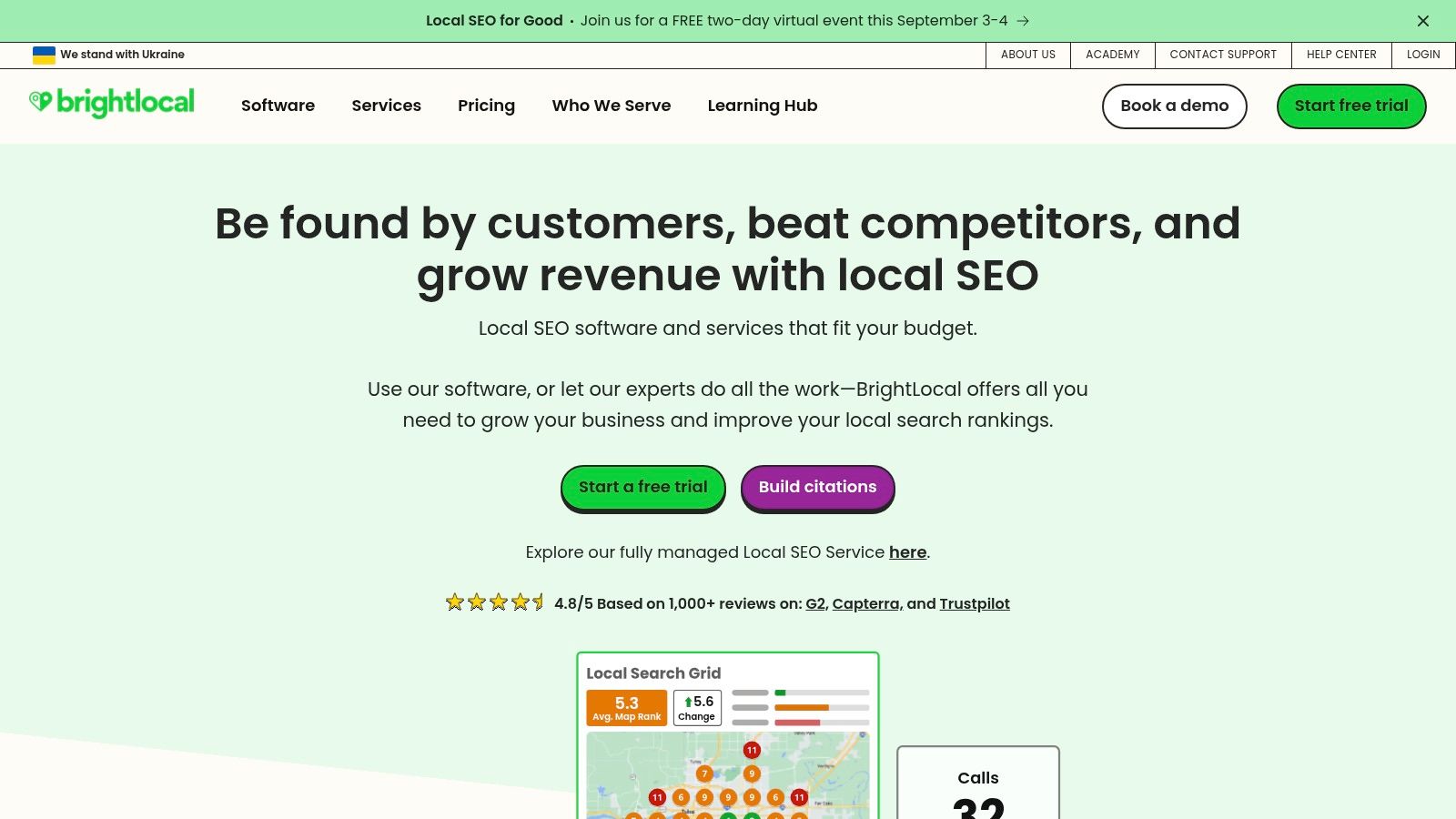
What makes BrightLocal unique is its purpose-built design for local optimization. The platform integrates seamlessly with Google Business Profile, allowing you to schedule posts, respond to reviews, and track performance directly from its dashboard. This laser focus makes it one of the most practical and efficient small business SEO tools for companies that serve a specific geographic area.
Use Case and Implementation
A multi-location dental practice can use BrightLocal's "Get Reviews" feature to create a customized email or SMS campaign. They can automatically send a follow-up message to patients after their appointments, asking for a review. This simple, automated action directly impacts their star rating and visibility in the local map pack, a task that would be incredibly time-consuming to manage manually across multiple locations.
Key Insight: BrightLocal's strength is its ability to centralize and simplify local SEO tasks. A practical insight is using the citation tracker. It will find inconsistent Name, Address, and Phone number (NAP) listings across the web (e.g., "Main St." vs. "Main Street"). Fixing these small inconsistencies is a powerful trust signal to Google and can directly contribute to higher local rankings, a task made simple by the tool's clear dashboard.
Pros & Cons
| Pros | Cons |
|---|---|
| Designed specifically for local search needs | Pricing scales with the number of locations |
| Modular pricing covers software and services | Some services like citations add extra costs |
| Excellent Google Business Profile integration | Not an all-in-one tool for general or technical SEO |
Pricing & Access
BrightLocal offers a flexible, modular pricing structure that starts around $39 per month for a single business. Plans scale based on the number of locations you need to manage. Services like the Citation Builder are pay-as-you-go, allowing you to control costs. This model is ideal for small businesses that want to pay only for the specific local SEO features they actively use. Learn more about how online business ratings can help your company succeed to complement your strategy.
Website: https://www.brightlocal.com
8. SpyFu
SpyFu is a highly specialized competitive intelligence tool designed to demystify what your rivals are doing in both organic and paid search. It's one of the most cost-effective small business SEO tools for businesses that want to focus heavily on reverse-engineering competitor strategies without the high cost of an all-in-one suite.
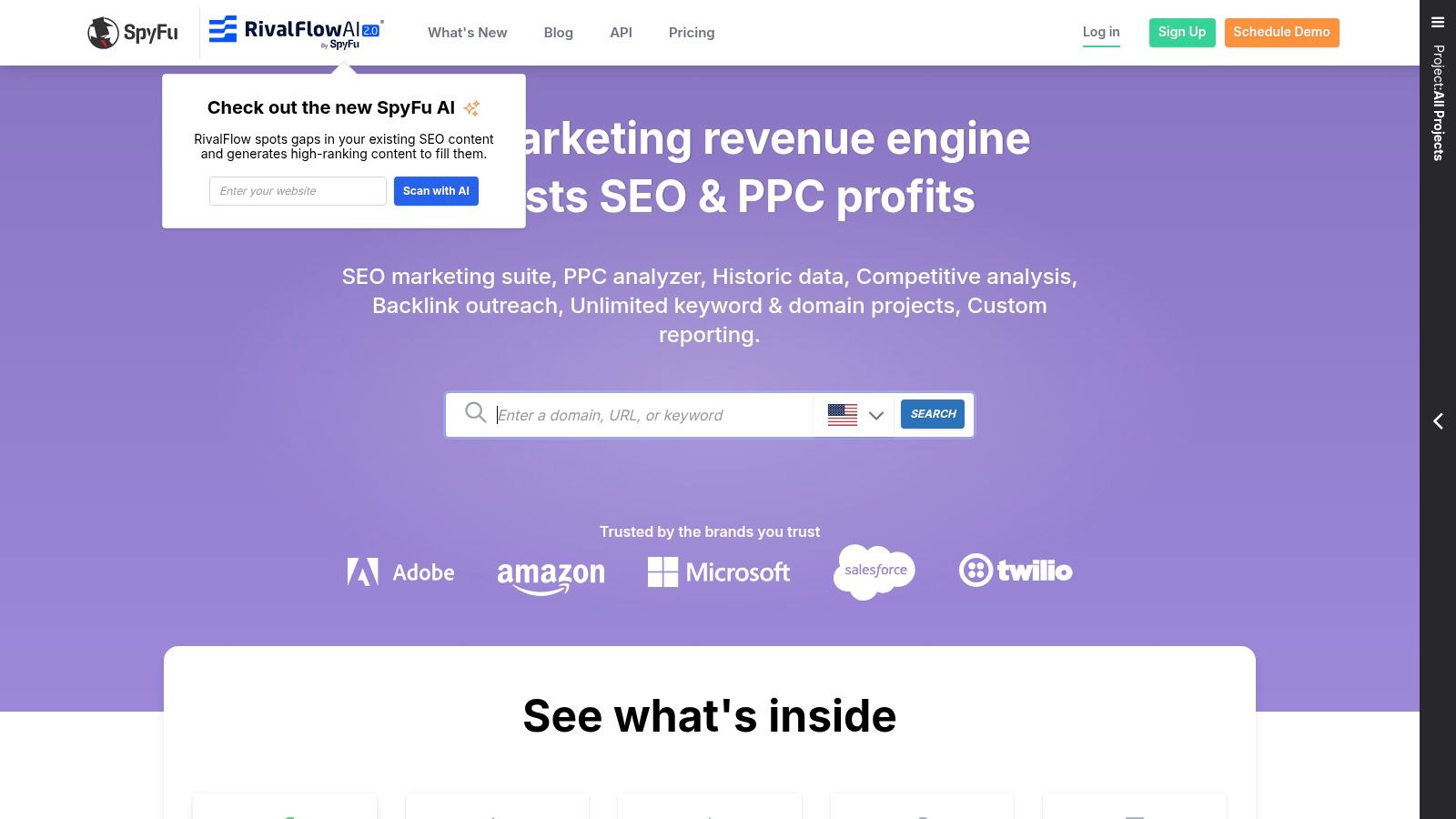
What makes SpyFu stand out is its historical data. You can see a competitor's keyword rankings and ad copy going back years, uncovering patterns and successful campaigns that you can learn from. Its generous data allowances, including unlimited exports on paid plans, make it an incredible value for data-hungry marketers.
Use Case and Implementation
A local HVAC company could use SpyFu to enter the domains of its top three competitors. A practical action is to use the "Kombat" feature. It will show a Venn diagram of keywords: those that all competitors rank for (core terms), and those that only one or two rank for (opportunity keywords). This allows the HVAC company to find profitable keywords their competitors are overlooking, like "ductless mini-split installation cost [city]," giving them a unique angle to target.
Key Insight: SpyFu's strength is uncovering the entire SEO and PPC playbook of your competition. A useful insight comes from analyzing a competitor's Google Ads history. You can see the ad copy they have been running for years. If a specific ad has been active for a long time, it's a strong signal that it's profitable. You can adapt the messaging and value proposition of that proven ad for your own SEO meta descriptions and page titles.
Pros & Cons
| Pros | Cons |
|---|---|
| Strong value with unlimited exports on higher tiers | Data-dense interface can be overwhelming |
| Excellent for both SEO and PPC competitor research | Smaller backlink dataset compared to Ahrefs |
| 30-day money-back guarantee | Less focus on technical site auditing |
Pricing & Access
SpyFu's pricing is very competitive, with its "Basic" plan starting at just $39 per month. This entry-level plan provides a substantial amount of data, making it accessible for even the smallest businesses. The unlimited data exports and API access come with the "Professional" plan, which is still priced affordably compared to many competitors. This pricing structure makes it a fantastic starting point for competitive analysis.
Website: https://www.spyfu.com
9. Google Business Profile (GBP)
For any brick-and-mortar or service-area business, Google Business Profile (formerly Google My Business) is not just another tool; it's the absolute foundation of local SEO. This free platform is one of the most essential small business SEO tools because it allows you to manage how your business appears on Google Search and Maps, directly influencing your visibility in the coveted local pack.
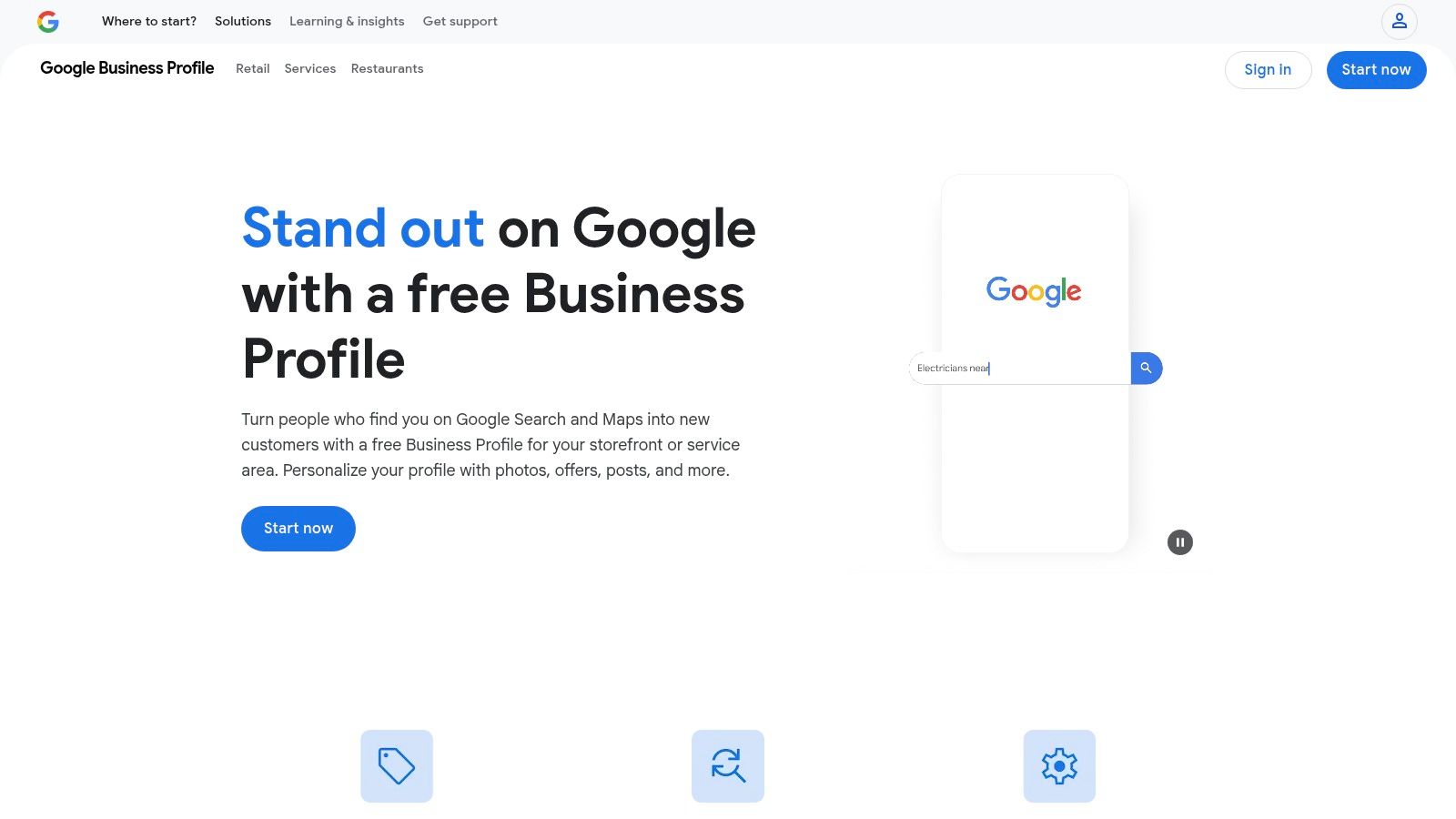
What makes GBP unique is its direct impact on local search rankings and customer interaction at zero cost. It’s not an analytics tool in the traditional sense, but a live, customer-facing profile that acts as a digital storefront. It empowers you to control your business hours, services, photos, and customer reviews, all within Google's ecosystem.
Use Case and Implementation
A local restaurant owner should use the "Posts" feature weekly. A practical example is creating a post every Friday morning with a high-quality photo of a weekend special, like "Fresh Lobster Rolls – available this weekend only!" This post appears directly in the search results when people look for the restaurant, acting as a free, timely advertisement that can entice a user to choose them over a competitor.
Key Insight: Optimizing your GBP is a direct conversation with Google. A critical insight lies in the Q&A section. Proactively add your own questions and answers. For example, add the question "Do you have outdoor seating?" and answer it with "Yes, we have a beautiful pet-friendly patio!" This not only helps customers but also allows you to naturally include keywords like "pet-friendly patio" in your profile, which can help you rank for those specific searches.
Pros & Cons
| Pros | Cons |
|---|---|
| Completely free and incredibly impactful for local SEO | Verification process can sometimes take time |
| Directly influences local pack and Maps visibility | Limited advanced analytics compared to paid tools |
| Enables direct interaction with customers (reviews, Q&A) | Requires consistent management to stay effective |
Pricing & Access
Google Business Profile is 100% free to create and manage. There are no paid tiers or hidden costs. All a business owner needs is a physical address or a defined service area and a Google account to get started. The value provided for the cost (zero) is unmatched, making it the highest ROI SEO activity for nearly any local small business.
Website: https://www.google.com/business
10. Shopify App Store – SEO Apps Category
For ecommerce entrepreneurs, the Shopify App Store is an essential destination for some of the best small business SEO tools tailored specifically for an online storefront. Rather than a single tool, it's a dedicated marketplace offering hundreds of applications designed to enhance a Shopify store's search engine performance, from technical audits to content optimization.
What makes the Shopify App Store unique is its seamless integration. Apps can be installed with a single click, immediately connecting to your store's backend to manage everything from meta tags and image alt text to structured data (schema markup) and 301 redirects. This accessibility empowers store owners, even those without technical expertise, to implement advanced SEO tactics directly within their familiar Shopify dashboard.
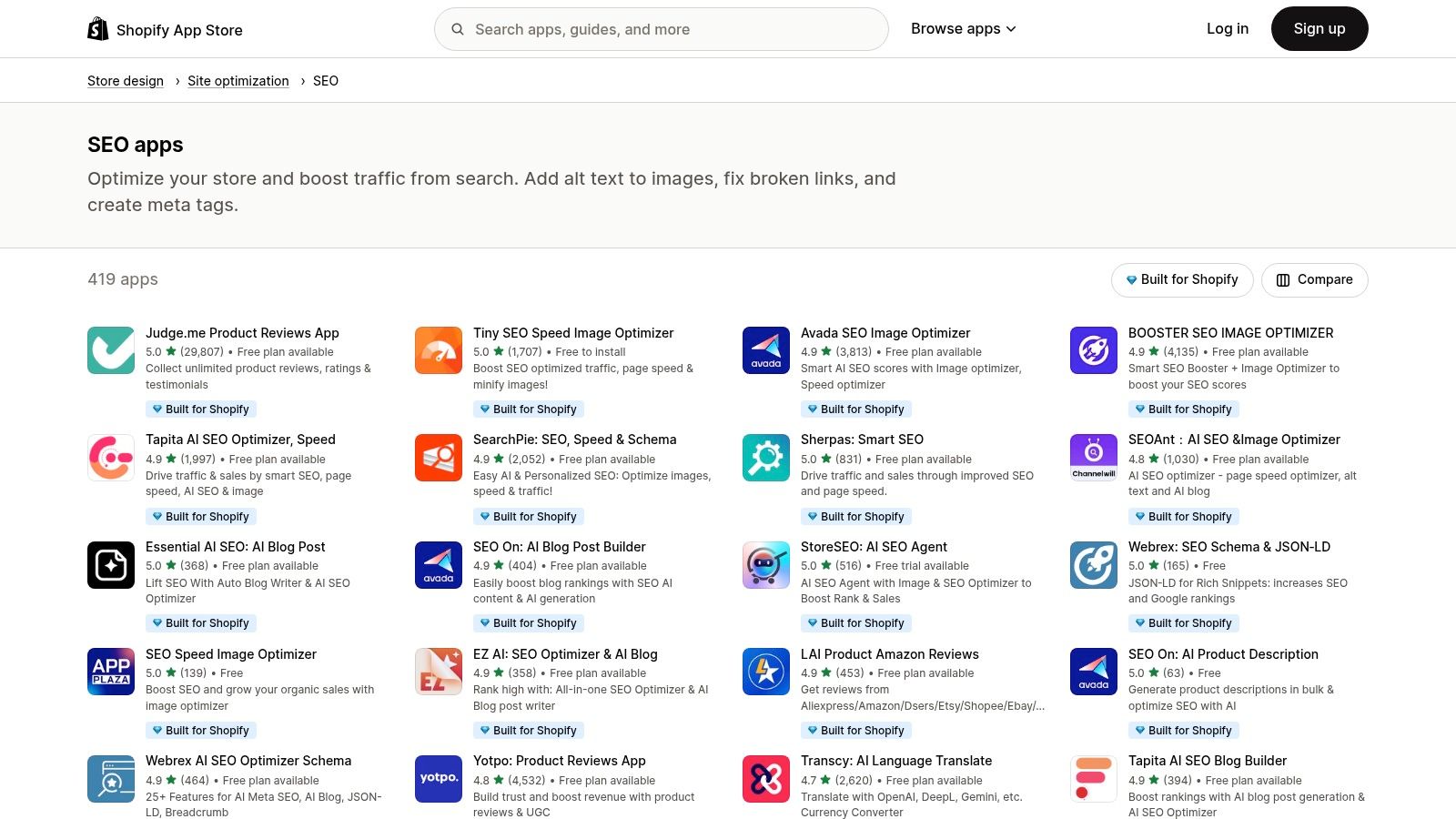
Use Case and Implementation
An online boutique owner could use an app like "SEO Manager" or "Booster SEO." A very practical use is implementing the app's broken link finder. After running a scan, the app will list all the 404 errors, which often come from old, deleted product pages. The app then provides a simple interface to redirect that broken URL to a relevant category page or a similar product, instantly fixing the user experience and preserving any link equity that old page might have had.
Key Insight: The true value lies in modularity. A key insight is how these apps handle structured data (schema). An app like "Schema Plus for SEO" can automatically add product schema to all your product pages. This allows Google to show rich snippets like price, availability, and review ratings directly in the search results, making your listings stand out and significantly increasing click-through rates.
Pros & Cons
| Pros | Cons |
|---|---|
| Seamless one-click integration with Shopify stores | App quality and support can vary significantly |
| Wide variety of free, freemium, and paid apps | Risk of "app bloat" slowing down your site if overused |
| User reviews and ratings help in selecting the right tools | Functionality can be niche, sometimes requiring multiple apps |
Pricing & Access
Pricing varies dramatically, from completely free apps for basic tasks to sophisticated suites costing over $50 per month. Many popular apps operate on a freemium model, offering a robust free plan with paid tiers for advanced features or higher usage limits. This allows small businesses to start with free tools and scale their investment as their needs and revenue grow. Access is available directly within the Shopify admin dashboard.
Website: https://apps.shopify.com/categories/store-design-site-optimization-seo/all
11. G2 – SEO Tools Category
While not a tool itself, G2’s SEO Tools category is an indispensable resource for any small business owner navigating the crowded market of small business SEO tools. It functions as a massive, user-driven comparison directory where you can discover, vet, and compare hundreds of software options based on verified peer reviews, satisfaction scores, and detailed feature breakdowns.
What makes G2 so valuable is its neutrality and transparency. Instead of relying on marketing copy, you get direct feedback from other business owners. Its powerful filtering system allows you to zero in on tools that are specifically rated highly by other small businesses, helping you find solutions that fit your budget and technical comfort level.
Use Case and Implementation
A marketing manager for a small e-commerce store needs a new rank tracking tool. A practical step on G2 is to filter the "SEO Tools" category by "Small Business" and then add another filter for a specific feature, like "Local Rank Tracking." This instantly narrows down hundreds of options to a manageable list of tools that are proven to work well for businesses of their size and meet their specific need, saving hours of research time.
Key Insight: G2’s power lies in de-risking your software investment. A valuable insight can be found by reading the negative reviews. While positive reviews are often generic, the 1-star and 2-star reviews from verified users pinpoint specific flaws—for instance, "the backlink data is three months old" or "customer support is non-existent." This inside information is crucial for avoiding a tool that looks good on paper but fails in practice.
Pros & Cons
| Pros | Cons |
|---|---|
| Neutral platform with extensive, fresh user reviews | Pricing shown may lag behind vendor updates |
| Excellent for discovering niche and emerging tools | Not a direct seller; redirects to vendor sites |
| Powerful filters for small business needs | The sheer volume of options can be daunting |
Pricing & Access
Access to G2 is completely free for users browsing and comparing software. The platform makes money through vendor listings and lead generation. You can browse all reviews, create comparison reports, and access all data without a subscription. To access the tools themselves, you will be redirected to the vendor's website, where their respective pricing plans and trials are available.
Website: https://www.g2.com/categories/seo-tools
12. AppSumo – SEO Software Deals
AppSumo isn't a single tool but a marketplace that offers an incredible opportunity for budget-conscious entrepreneurs. It’s a goldmine for finding lifetime and heavily discounted deals on up-and-coming small business SEO tools, from rank trackers and on-page optimizers to technical audit software. This makes it an ideal platform for businesses looking to build a powerful SEO toolkit without committing to recurring monthly subscriptions.
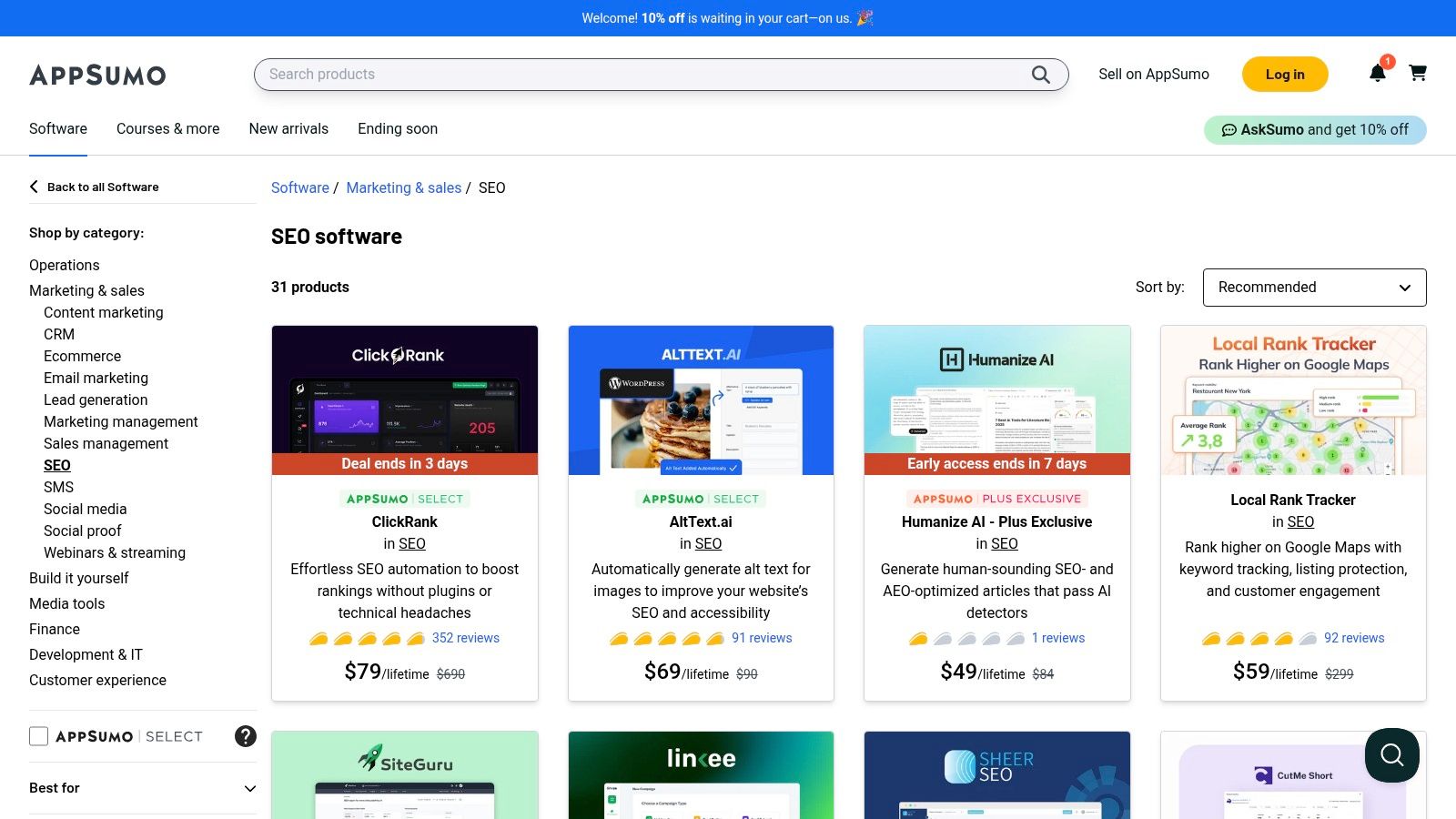
The uniqueness of AppSumo lies in its lifetime deal (LTD) model. You pay once and own the software license forever. This model provides access to emerging technologies and allows small businesses to experiment with different tools to find what works best for them, all while keeping costs exceptionally low. The 60-day money-back guarantee also removes much of the risk.
Use Case and Implementation
A startup marketing agency on a tight budget can use AppSumo strategically. For example, they see a lifetime deal for a new AI writing assistant specialized in creating SEO-optimized blog outlines for $69. By purchasing this, they can significantly speed up their content creation process for clients. This single purchase could save them hundreds of dollars per month compared to a subscription-based AI writer, immediately improving their profit margins.
Key Insight: AppSumo is a strategic discovery platform. The key insight is to read the user question section on each deal page before buying. This is where early adopters ask the founders tough questions about the product's roadmap, limitations, and future plans. This provides a level of transparency you rarely get, helping you gauge if the tool is a hobby project or a serious, long-term business you can rely on.
Pros & Cons
| Pros | Cons |
|---|---|
| Very low total cost of ownership through lifetime deals | Deals rotate frequently and may not return |
| Great discovery channel for new and emerging SEO tools | Support and product roadmaps vary widely by vendor |
| 60-day refund window offers a safety net | Not all tools mature into long-term, sustainable products |
Pricing & Access
Pricing on AppSumo is deal-specific, with most lifetime offers ranging from $49 to $99 as a one-time payment. There are often multiple tiers within a deal, allowing you to unlock more features or higher usage limits for a larger one-time fee. Access is granted immediately after purchase, but it's crucial to watch for new deals as the best ones can sell out quickly.
Website: https://appsumo.com/software/marketing-sales/seo/
Top 12 Small Business SEO Tools Comparison
| Tool | Core Features | User Experience & Quality ★ | Value Proposition 💰 | Target Audience 👥 | Unique Selling Points ✨ |
|---|---|---|---|---|---|
| Semrush | Keyword & competitor research, site audit, backlink tools | ★★★★☆ Learning curve for non-SEOs | 💰 Premium pricing per seat | SMBs, solo founders | 🏆 Broadest all-in-one toolkit, integrations |
| Ahrefs | Backlink index, keyword & content tools, audits | ★★★★☆ Clear limits, no free trial | 💰 Mid to high, no a la carte | SMBs, agencies | 🏆 Best backlink data, transparent usage |
| Moz Pro | Rank tracking, site audits, link metrics | ★★★☆☆ Beginner-friendly interface | 💰 Mid-tier, strong educational | Small teams, beginners | ✨ Strong learning resources |
| Screaming Frog SEO Spider | Technical SEO crawler, JS rendering, integrations | ★★★★☆ Deep insights, desktop app needed | 💰 Great value, one-time license | Technical SEOs, agencies | 🏆 Highly configurable, technical depth |
| SE Ranking | Rank tracking, audits, local SEO modules | ★★★☆☆ Busy interface initially | 💰 Competitive pricing, add-ons | SMBs, local businesses | ✨ Flexible add-ons, local marketing suite |
| Ubersuggest | Keyword research, site audits, rank tracking | ★★★☆☆ Simple, beginner-friendly | 💰 Budget-friendly monthly/lifetime | Solo founders, very small teams | 💰 Low-cost, easy to use |
| BrightLocal | Local rank tracking, GBP monitoring, citations | ★★★☆☆ Modular pricing, location-based | 💰 Scales with locations | Local SMBs, agencies | ✨ Local SEO focus, citations & reviews mgmt |
| SpyFu | Competitor keywords & ad history, rank tracking | ★★★☆☆ Data-dense UI | 💰 Affordable, unlimited exports | SMBs, PPC & SEO marketers | ✨ Unlimited data exports on paid plans |
| Google Business Profile | Business info, reviews, insights | ★★★★☆ Free, essential local tool | 💰 Free | Local SMBs (especially US) | 🏆 Crucial local SEO presence |
| Shopify SEO Apps Store | SEO apps for Shopify: meta, schema, redirects | ★★★☆☆ Mix of free & paid, quality varies | 💰 Mixed pricing, app-based | Ecommerce SMBs | ✨ Wide app variety, easy install/uninstall |
| G2 – SEO Tools | User reviews, rankings, comparisons | ★★★★☆ Fresh, verified reviews | 💰 Free info, vendor pricing varies | SMBs researching SEO tools | ✨ Neutral, up-to-date user insights |
| AppSumo SEO Deals | Discounted SEO software deals, lifetime licenses | ★★★☆☆ Rotating deal availability | 💰 Very low TCO with lifetime deals | Budget-conscious SMBs | 💰 Lifetime deals, 60-day refunds |
Making Your Choice: From Tools to Tangible Results
Navigating the landscape of small business SEO tools can feel like learning a new language. We’ve journeyed through a comprehensive list, from all-in-one powerhouses like Semrush and Ahrefs to specialized workhorses like Screaming Frog and BrightLocal. We’ve explored how platforms like Shopify and AppSumo offer unique ecosystems of opportunity and savings. The sheer volume of data, features, and pricing tiers can be overwhelming, but the core takeaway is simple: the perfect tool doesn't exist, but the right tool for you certainly does.
The key isn't to subscribe to every platform mentioned. Instead, it's about strategically selecting a toolkit that aligns with your specific business goals, budget, and current stage of growth. Your journey from tool selection to tangible results begins with a clear understanding of what you need to achieve first.
How to Choose Your Starting Toolkit
Don't try to boil the ocean. The most common mistake small business owners make is investing in a powerful, expensive tool without the time or expertise to leverage its full potential. Instead, adopt a phased approach based on your most immediate needs.
- If you are brand new to SEO and need foundational insights: Start with the free, indispensable tools. Set up your Google Business Profile completely and accurately. Use Google Search Console to understand how Google sees your site and identify basic errors. These platforms cost nothing but provide the essential data you need to begin.
- If your primary goal is to rank locally: Your first paid investment should be a tool like BrightLocal. Its focus on citation building, review management, and local rank tracking directly addresses the factors that move the needle for brick-and-mortar businesses and service-area companies.
- If content creation is your core strategy: A tool like Ubersuggest or the entry-level plan of SE Ranking offers a fantastic balance of keyword research, topic ideation, and competitor analysis without the steep learning curve or high cost of enterprise-level platforms. You can identify what your customers are searching for and build content that answers their questions.
- If your website has technical issues or is larger than a few pages: The free version of Screaming Frog SEO Spider is a must. Crawling your first 500 URLs will uncover broken links, missing title tags, and other critical errors that could be holding you back. This is often the lowest-hanging fruit for significant SEO improvement.
From Data Points to Strategic Action
Remember, these small business SEO tools are diagnostic instruments; they provide the data, but you must supply the strategy. A tool might tell you that a competitor ranks for a specific keyword, but it can't tell you the strategic reason why you should or shouldn't pursue it. It can identify a technical error, but it requires human insight to prioritize the fix based on its potential impact on revenue.
For example, Ahrefs might show you have 50 broken backlinks. The strategic action isn't just to disavow them all. It’s to analyze the most valuable lost links, reach out to those site owners, and try to reclaim that authority. Similarly, SpyFu might reveal a competitor's top pay-per-click keywords. The insight here isn't just to copy them, but to identify gaps in their strategy where your organic content can provide a better, more comprehensive answer.
The ultimate goal is to build a repeatable process. Dedicate time each week or month to review your data, identify one or two key priorities, and execute. Whether it’s writing a new blog post based on keyword research from Semrush or fixing technical errors flagged by Moz Pro, consistency is what transforms raw data into improved rankings and increased traffic. This disciplined approach ensures your investment in SEO tools pays dividends, turning abstract metrics into real-world business growth.
Feeling overwhelmed by the data and unsure how to translate it into a winning strategy? The team at Latitude Park specializes in taking the powerful insights from these exact small business SEO tools and building comprehensive campaigns that drive results. Let us handle the complexities of technical optimization, content strategy, and competitive analysis so you can focus on what you do best: running your business. Visit us at Latitude Park to learn how we can help you grow.
